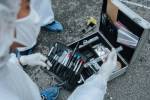Forensic Pathology
Pathology is a medical specialty concerned with the study of disease. The main way pathologists study disease is by conducting an autopsy i.e. a comprehensive surgical examination of the deceased. By definition, therefore, forensic pathology primarily relates to the study of disease within a legal context.
What Does A Forensic pathologist Do?
The roles and responsibilities of the forensic pathologist include:
- Determining cause of death.
- Forensic examination of the body (external/internal/clothing.)
- Identifying absense/presence of disease from tissue samples.
- Examining post mortem wounds & Injuries.
- Collaborative evidence collection e.g. blood, hair, semen samples passed to criminalists, toxicologists etc for specialist analysis.
- Collaborative investigation e.g. body identification work with forensic odontologists (dentists) and physical anthropologists.
- Acting as an expert witness in civil/criminal proceedings.
- Medical/Legal Authorities.
In respect of enquiries into suspicious, sudden or unexpected deaths, forensic pathologists will often work in conjunction with the appointed medical/legal representative of the area in which the investigation is taking place. In England and Wales this will be the Coroner, in Scotland the Procurator Fiscal and in the United States, the Coroner or the Medical examiner.
Want To Study Forensics/CSI?
Emerging Role
The American Academy of Forensic Sciences notes that examining patterns of injury in the living, as well as the deceased is emerging as another very important role for the forensic pathologist. Referred to as clinical forensic pathology this role is particularly relevant in child and elder abuse cases.
The Medical Examiner
The medical examiner (pathologist) is a medical doctor who specializes in anatomical or functional abnormalities of a human body. They undertake special forensic training and conduct medico-legal autopsies.
The following information is provided courtesy of The National Library of Medicine and is derived from interviews with Dr. Marcela Fierro and Dr. David Fowler, who talk about their career and experiences as chief medical examiners.
Becoming A Medical Examiner (Dr. Fierro)
I am a forensic pathologist and I serve as the chief medical examiner for the Commonwealth of Virginia. My career track began, I think probably, when I was in college and I was a science major and planned to go to medical school, which I did.
I went to the State University of New York at Buffalo and received my doctor of medicine degree in 1966. I completed a clinical internship, and then I entered a residency in pathology, which I thought would be very exciting because it's the study of the nature and causes of disease processes.
So I did that and that was four years and then I completed a fellowship in forensic pathology, which I found to be even more interesting because the problems there were extremely interesting. Problems of cause of death, you know what is the disease, the injury, or poison that resulted in the physiological death of the person.
Critical Skills For Medical Examiners (Dr. Fowler)
|
Critical skills to be a medical examiner are, I think, really a very open mind, the ability to think laterally is probably one of the most important issues, and then to be able to hold a reasonably large database of information that you've gathered from both reading the books, other people's experiences and your own observations. The reason that lateral thinking is somewhat important is that people manage to do the strangest things either to themselves or to each other. On any given day what you see may well be similar to what you've seen in the past, but not exactly the same. Therefore the ability to extrapolate from what you've seen in the past and to make those appropriate links is very, very important. |
|
Working With Families (Dr. Fowler)
Behind every single death we have, there is a family in almost every single case who are going through some of the worst times of their lives so there are multiple ways that we would interface with the family. Providing them information, some bereavement counseling, sometimes describing the disease process which puts them at risk, dealing with objection to autopsy and multiple insurance claims, etc.
There are multiple ways in which we will actually have to deal with the family and assist them and it does consume a significant proportion of our time. Sometimes the interactions are initiated by us because we need information the family has and during that process we start trying to support them. Other times they will initiate the contact to us because of their needs in that particular case.
General Autopsy Procedure (Dr. Fierro)
The autopsy itself is an extended surgical procedure and just as the surgeon might open you from the site at the bottom of your breastbone down to your public bone, we would extend that up to the shoulders so that we're able to look into the chest cavity and into the belly cavity. And we would look in the head by making an incision and pushing and pulling the scalp forward and removing the bone, looking and examining the brain and returning it. And autopsy if properly performed should not disfigure the body.
Now keep in mind many bodies come in and they are in terrible shape to begin with. They have terribly disfiguring injuries. Well, we're not going to improve their appearance, but hey shouldn't look any worse when they leave us. I think to a man the forensic pathologist holds the body in special reverence and does most anything he can do to keep from having to disfigure it further than it already is.
Purpose & Criteria For A Medico-Legal Autopsy (Dr. Fowler)
The purpose of conducting an autopsy is to assist the medical examiner in determining the cause of death within a reasonable degree of medical certainty. Now the autopsy itself is not the only tool that one uses to do that. You take all the information that you can get from the scene, the medical records, family information, etc., etc. and use that to make a decision as to whether an autopsy is necessary.
So when we look at the criteria for when an autopsy is necessary, the medical examiner gets to decide whether or not performing that autopsy is going to provide additional information to determine the cause of death that's going to be critical in this particular case. In some cases, let me use an example here; when a person dies quietly in bed, they are relatively elderly, there's nothing suspicious going on, the medical examiner may elect not to do an autopsy because there's really not good driving reason to do so.
In other cases where a young person died in similar circumstances, obviously there is a critical need to do the autopsy so it has to have some outcome on the actual, or it has to fit the outcome so to speak in that particular case. Do I have enough information just from investigation alone or does the autopsy or will the autopsy provide me with additional information? That's the one set of autopsies that we will do.
There are another set of autopsies that we will do obviously to document the injuries in a person very accurately because there are legal implications down the line and that information is going to be critical to other persons in this particular investigation such as state's attorneys, police, insurance companies, etc.
Recent Articles
-
All About Forensic Science
Nov 12, 24 03:05 AM
A forensic science website designed to help anybody looking for detailed information and resources. -
The Role of Forensic Evidence in Criminal Defense Cases
Sep 05, 24 03:38 AM
Article exploring five key roles that forensic evidence plays in criminal defense cases -
The Evolving Role of Medical Science in Forensic Investigations
Aug 06, 24 03:35 AM
Insightful article exploring the critical role of medical science in forensic investigations.


New! Comments
Have your say about what you just read! Leave me a comment in the box below.